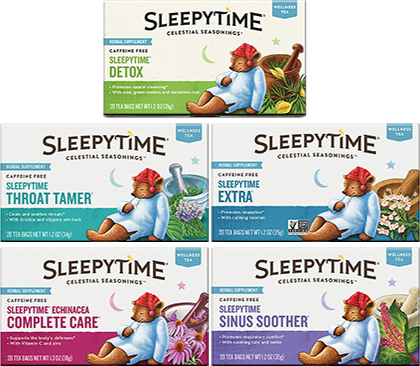
Some reviewers mention that they didn’t love the smell the valerian adds, but many comment that it helped them reduce anxiety and sleep better. Lemon balm has been used as an alternative treatment for insomnia - though more research is needed - and peppermint has been shown to act as a muscle relaxant in animal studies.īoth ingredients are linked to better sleep, but they could benefit from more rigorous scientific research. This tea also contains lemon balm and peppermint leaf. However, a 2011 study found that passionflower helped participants improve their sleep after 7 days. More research is needed, though, to measure this effect in humans. Traditional Medicinals Organic Nighty Night Extra combines valerian root with additional herbs and natural ingredients, including passionflower herb.Ī 2017 animal study found that 500 milligrams of passionflower increased total sleep time and reduced wakefulness.

We also checked whether brands were upfront about their ingredients and provided information about tea sourcing and processing. Speaking of quality, we stuck to well-known brands with established websites and plenty of positive customer feedback. For the others, we read through customer reviews to get a good idea of taste, effect, and tea quality. We sampled a few of the blends to give you the most accurate insight on taste and impact. Some teas on our list contain chamomile, but they’re paired with additional herbs used to help promote better sleep. You can pick up a box of chamomile tea at any grocery store, so we looked for teas with a little more to offer beyond this tried-and-true, but perhaps a little tired, herb. We only selected teas without caffeine, of course, but we also looked for blends featuring ingredients sure to evoke sleepiness. You can’t make a good bedtime tea without the right components. Here’s how we decided which teas to include: We considered plenty of relaxing bedtime blends to create our final list of recommendations. If you’ve graduated from chamomile tea and need something with a little more relaxation potential, try the six teas listed below to fall asleep faster and sleep soundly. Bedtime teas blend specific herbs to help you defeat insomnia naturally, so they make a great option if you prefer to avoid medicinal sleep aids. Trouble falling asleep isn’t uncommon, especially during times of increased stress. If you had a hard time sleeping in childhood (or beyond), perhaps your parent or grandparent recommended a chamomile blend to help you drift off. While caffeinated teas can have stimulating benefits, many herbal teas have the opposite effect.Ĭhamomile tea is widely used in alternative medicine to promote relaxation, drowsiness, and restful sleep.

Herbs, such as chamomile and peppermint, might even help relieve menstrual cramps, muscle cramps, and indigestion. You might drink tea with honey and lemon when you have a sore throat, green tea for its antioxidant benefits, or black tea for a burst of energy. Best lavender tea for sleep: Clipper Organic Snore and Peace Herbal TeaĪ hot drink can warm you up on a cold day, and tea, in particular, can help soothe a number of ailments.Best tea for a cough that’s keeping you awake: Celestial Seasonings Honey Vanilla Chamomile Tea.Best dessert-like tea to help you sleep: Taylors of Harrogate Yorkshire Tea Bedtime Brew.Best red tea to help you sleep: The Republic of Tea Get Some Zzz’s.Best tea for supporting sleep and overall wellness: Yogi Bedtime Tea.Best valerian tea to help you sleep: Celestial Seasonings Sleepytime Extra.Best tea to help you sleep if you’re avoiding valerian root: Gaia Herbs Sleep & Relax Herbal Tea.Best overall: Traditional Medicinals Organic Nighty Night Extra Tea.A quick look at the best teas to help you fall asleep


 0 kommentar(er)
0 kommentar(er)
